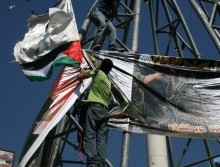 A range of protests on economic struggles staged across the West Bank on Wednesday brought back memories of the protests in the Middle East that ultimately led to the collapse of governments—a comparison made by the current head of the Palestinian government, Mahmoud Abbas. President Abbas was quoted by the Ma’an News Agency as calling the public lament the beginning of the “Palestinian Spring,” an allusion to the Arab Spring that has seen dictators in Tunisia, Egypt, Libya and Yemen lose power.
A range of protests on economic struggles staged across the West Bank on Wednesday brought back memories of the protests in the Middle East that ultimately led to the collapse of governments—a comparison made by the current head of the Palestinian government, Mahmoud Abbas. President Abbas was quoted by the Ma’an News Agency as calling the public lament the beginning of the “Palestinian Spring,” an allusion to the Arab Spring that has seen dictators in Tunisia, Egypt, Libya and Yemen lose power.
Attempting to put a more positive spin on the situation, Abbas said it was his government that is “in line with what the people say and what they want.”
However, at least one member of that government—Prime Minister Salaam Fayyad—was a popular target for the complaints. Calls were made for Fayyad’s resignation in Nablus, according to Ma’an, and in Hebron his effigy was burned.
Ma’an said rising prices, particularly fuel, were a key reason for the protests. Abbas also addressed concerns about inconsistency in paying salaries. Fayyad—who has been perceived by the West as economically-effective and opposed to corruption—has long worried over the financial state of the Palestinian economy.
While Abbas said they are “trying to do what we can do” to lower costs for the populace, protesters in Ramallah—the main city in the West Bank—were quoted by Ma’an as saying, “We were looking for Palestine, but now we are looking for a sack of flour,” among other statements.
Israel, a common scapegoat for Arab leadership in the Middle East with their people, received some attention in the Ma’an report. Protesters called for an economic arrangement with Israel agreed as part of the Oslo Accords to be ended, claiming it was hurting the Palestinian economy. However, the Palestinian Minister of National Economy Jawad Naji cast blame on the global economic difficulties, reported Ma’an.
(By Joshua Spurlock, www.themideastupdate.com, September 5, 2012)
